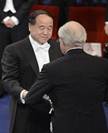题目内容
Mo Yan won the Nobel Prize in 2012. Many fans are eagerly waiting for his new novel to ______.
| A.come out | B.turn out | C.make out | D.go out |
A
解析试题分析:考查动词短语辨析。A出版,发行;开花;B结果是,原来是;证明是;C辨认出,理解;D外出,熄灭;句意:在2012年莫言获得了诺贝尔奖,很多他的书迷都等着他的新的小说的出版。故A正确。
考点:考查动词短语辨析
点评:动词的短语辨析要根据上下文的语境进行,要把短语的意思和句意相结合。同时也要注意一个短语多种意义的现象;在平时的学习中要把同种类型的短语放在一起比较,如同一个动词+不同的介词/副词;同一个介词/副词+不同的动词。诸如此类的固定短语,属于最基本的知识,如果学生有错误,则应该加强背诵并平时多解题,进而加以巩固.

 备战中考寒假系列答案
备战中考寒假系列答案Mo Yan, the winner of this year’s Nobel Prize for Literature, said he is not sure about whether he is happy after winning the prize.
In an interview with China Central Television broadcast on Sunday night, Mo said “I don't know,” when a reporter asked if he was happy.“Happiness means a healthy body and a total absence of mental burdens, but now I’m under high pressure and bothered by worries. Can I say that I'm happy?” he said. “But if I say I'm not happy, people will consider that I'm striking a pose. How could you be unhappy after winning the Nobel Prize?”
Mo, born into a farmer’s family in East China’s Shandong province, As a 12-year-old during the Cultural Revolution he left school to work, first in agriculture, later in a factory. In 1976 he joined the People’s Liberation Army and during this time began to study literature and write. His first short story was published in a literary journal in 1981.
“In his writing, Mo Yan draws on his youthful experiences and on settings in the province of his birth. This is apparent in his novel Hong gaoliang jiazu (1987, in English Red Sorghum 1993),” said the academy in a statement of Mo’s biography. Red Sorghum was successfully filmed in 1987, directed by famous Chinese director Zhang Yimou.
Mo won the Nobel Prize for Literature, which is worth $1.2 million, on Oct 11 for his “hallucinatory realism” which merges “folk tales, history and the contemporary”. Dozens of his works have been translated into English, French and Japanese and many other languages.
He is the first Chinese citizen to win the prize.The award sparked strong interest about contemporary Chinese literature among the public, and his books have been flying off the shelves in many bookstores across the country.
【小题1】The followings are TRUE except_____________.
| A.He has won about 8 million yuan. |
| B.His works are all about farmers. |
| C.He has a big influence on Chinese contemporary literature. |
| D.Reporters have interviewed him about his winning. |
| A.He won the prize because of his story Red Sorghum. |
| B.He wanted to become a writer when he was very young. |
| C.Mo Yan’s works have been translated into Russian. |
| D.Mo Yan was born in a farmer family. |
| A.His different work. | B.His early life. |
| C.He switched over to literature. | D.His family and hometown. |
| A.Mo Yan is very happy to win the Nobel Prize. |
| B.More and more readers are buying Mo’s books to read in China. |
| C.Winning the Nobel Prize is not easy. |
| D.Mo Yan won the prize with the help of Zhang Yimou. |

We couldn’t forget the historic moment on Oct.11, 2012, when the first Chinese Nobel laureate, Mo Yan, won the 2012 Nobel Prize for Literature. Minutes after the award was announced, millions of Chinese expressed pleasure and pride for Mo Yan on the Internet. So a Chinese getting the Nobel Prize for literature did really increase the national pride.
On Dec.11 (Monday) in Sweden Mo was given the Nobel diploma, medal and a document confirming the prize amount. In his speech at the ceremony, Mo said receiving the prize felt like a fairy tale, but of course it was true and that literature was useless compared with science. Mo's award filled the blank left by Chinese literature in the world literary history. Meanwhile, Monday's Nobel awards ceremony set off another buying rush on Mo's works among Chinese readers.
【小题1】Mo Yan won the Nobel Prize for _________.
| A.history | B.Literature | C.peace | D.physics |
| A.Calm | B.Relaxed | C.Proud | D.indifferent |
| A.loser | B.winner | C.fan | D.superstar |
| A.It was hard for Mo Yan to believe he was awarded the prize. |
| B.Mo Yan thinks Literature is useless. |
| C.Mo Yan was given the Nobel Prize, medal and a document. |
| D.Mo Yan’s works were more popular after his receiving the prize. |
